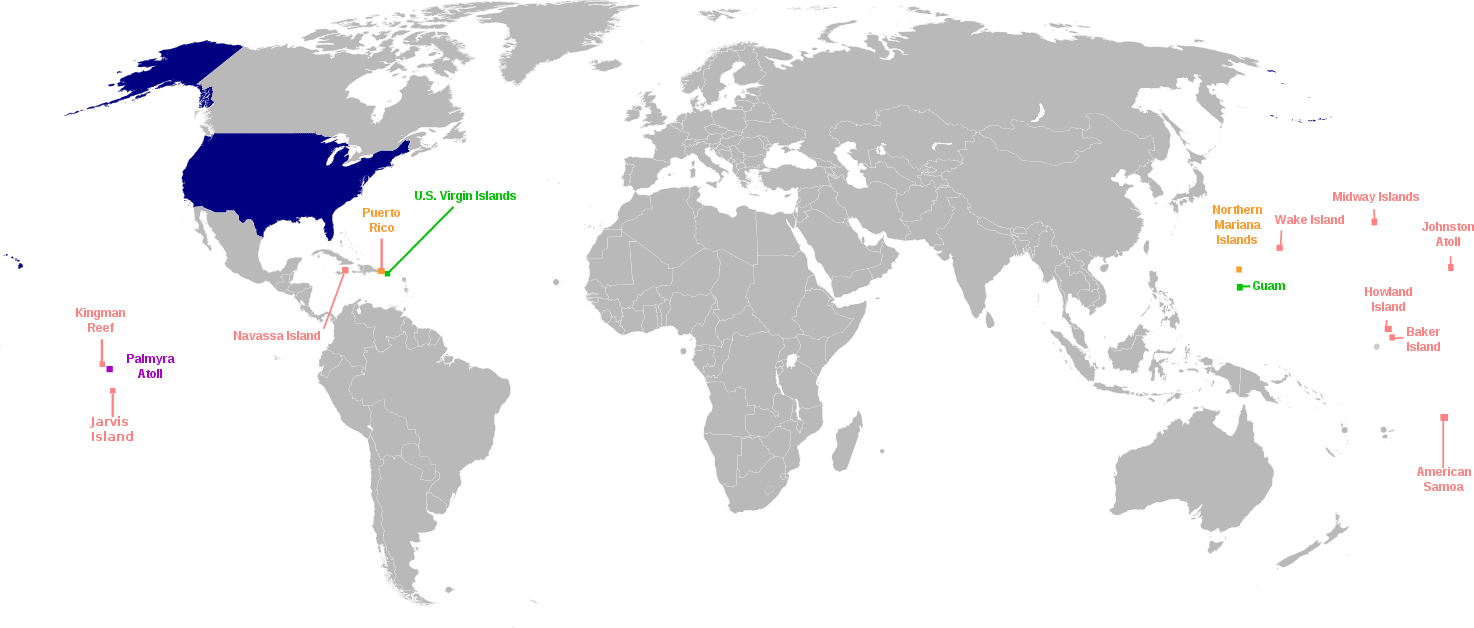
Do you dream of “the island life” as a U.S. territorial teacher? If so, you may want to know the Praxis requirements for U.S. overseas territories.
The U.S. has five overseas territories: American Samoa, the U.S. Virgin Islands, Puerto Rico, Guam, and the Northern Mariana Islands. Let’s look at the Praxis requirements for each territory.
Praxis Requirements for American Samoa
The official Praxis website has a full list of the Praxis requirements for American Samoa. On that page are a few particularly interesting facts about Praxis testing requirements on this small Pacific island.
There is a special requirement for teachers who aren’t proficient in Samoan. All early childhood, kindergarten, and elementary non-Samoan speaking teachers must take the Praxis Subject test for teaching English to speakers of other languages (5361). This is because young Samoan children may not be exposed to English in their own homes. As a result, beginning teachers in Samoa who are not bilingual must be prepared to deal with the ESL needs of younger Samoan students.
It’s also worth noting that American Samoa requires both the Praxis Core and the Praxis PLT, rather than just requiring one or the other. And of course, an additional Praxis Subject Assessment is required on top of these two exams.
Praxis Requirements for the U.S. Virgin Islands
The official Praxis page for the U.S. Virgin Islands shows simpler testing requirements for teachers, compared to American Samoa. To get licensed in the U.S. Virgin Islands, you only need to take the Praxis Core and a Praxis Subject Assessment test.
English is the primary language spoken by native U.S. Virgin Islanders, so teachers won’t necessarily need knowledge of other languages. Still, most immigrants to the Virgin Islands speak Spanish or French, so knowledge of those languages is a plus.
Praxis Requirements for Puerto Rico
Puerto Rico doesn’t require the Praxis, at least not in a strict sense. Puerto Rico is a Spanish-speaking territory, so the Praxis exams– which are administered in English– are of little use in Puerto Rico’s school systems. Instead, most licensed teachers in Puerto Rico must take the PCMAS, a Spanish-language teacher certification exam administered by the College Board.
You’ll notice that I said most teachers need to take the PCMAS. Puerto Rico also has teaching license reciprocity with some American states, provided the applying teacher speaks Spanish well. And of course, Puerto Rico also has international schools that accept Praxis scores and teaching licenses form the U.S. mainland.
Praxis Requirements for Guam
Like American Samoa, Guam’s Praxis requirements include both the Praxis Core and the Praxis PLT. There are no special requirements for teachers who don’t speak the indigenous Guam language. However, many children on Guam speak primarily either Chamorro or Tagalog in the home. So some ability in these languages is a plus for landing a Guam teaching job and being an effective teacher on Guam.
Praxis Requirements for the Northern Mariana Islands
There is no page for the Northern Mariana Islands on the official Praxis website. As part of my research for this article, I called ETS’s Praxis customer service to ask them if the Praxis is accepted in Northern Mariana.
The ETS representative I spoke with informed me that the Northern Mariana Islands does have indeed have its own set of Praxis requirements. These requirements are found on the Marianas public school website rather than on the ETS site for the Praxis.
So I searched the Commonwealth of the Northern Mariana Islands Public School System website. The most up-to-date information I could find on their site is in this PDF. The chart in the PDF lists CNMI requirements for the Praxis Core, the Praxis PLT, and Praxis Subject Assessments. So it seems that all three series of Praxis exams are required for Northern Mariana teachers.
Like Guam, the Northern Marianas doesn’t appear to have special requirements for teachers who don’t speak the local languages. Still, knowledge of Chamorro and Carolinian, the two official indigenous languages of Northern Marianas, is a plus for people who want to teach in this territory.





Leave a Reply